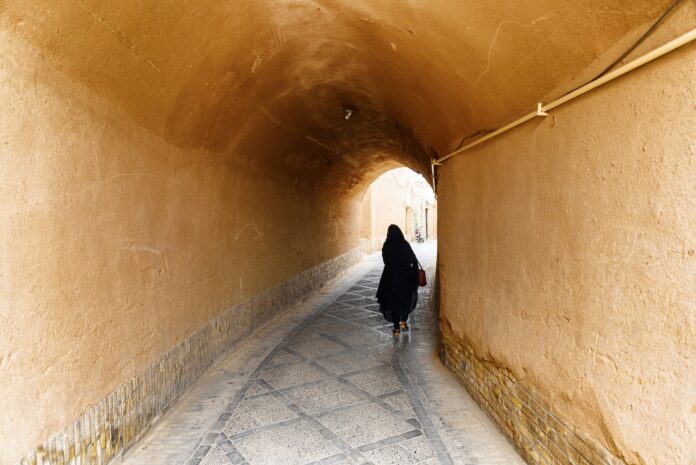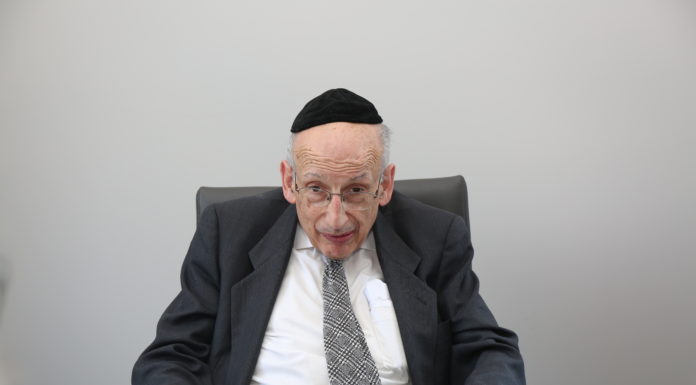Imagine being allowed into the confidences of some of the most powerful anti-Semites in the world—while they had no inkling that you were Jewish and were interested in finding out their views on Jews. Catherine Perez-Shakdam had just that experience in 2017, when she was invited to meet with Iran’s leaders, including Ayatollah Khamenei.
Perez-Shakdam is now a research fellow at the Henry Jackson Society in the UK, but back in 2017, she was affiliated with the Russia-supported RT news outlet, which was trusted by the Iranians—and which allowed her to get access to them.
During those meetings, she heard the Iranian leadership’s plans to monitor and harm Jews around the world. Last year, for the first time, she wrote publicly about her experiences and what she heard, and she announced a plan to write a book about that. She recently spoke with Ami about how she managed to infiltrate the Islamic Republic as a one-woman undercover program.
You were born Jewish, but you were married to a Muslim from Yemen. Did you maintain any type of Jewish observance while you were married?
No. I was born into a very secular environment. My mother passed away when I was 11, and my father wasn’t interested in practicing Judaism in any way. All of my Jewish education came from my grandfather, but he was also quite secular.
There seems to be some confusion online about whether you converted to Islam.
I’m aware of that. I never converted. I let people think I did because it made my life a lot easier. I never corrected people’s assumptions because I didn’t want to have that conversation, so I decided to be quiet and just do as I was told. I was married for ten years to a Muslim and lived for four years with him in Yemen.
Where are you from?
I’m from Paris. On my mother’s side we are French Jews, and on my father’s side we are Sephardic. My father’s parents were living in Spain in the 1930s, but they had to run away. They ended up in Tunisia with the aim of eventually going to Israel, but within weeks of their arrival the Nazis invaded the country, and they were sent to the camps.
Were you the target of anti-Semitism when you were living in Yemen?
Yes. When I first got married, everyone was very welcoming, but then they started making nasty comments and belittling me. They would constantly remind me of how gracious they were by allowing me into their family, telling me that I might as well just learn their ways or else my life would become very difficult.
After I gave birth to my son, my in-laws became very aggressive. They made it very clear that this was their grandchild and that I’d better not think he was Jewish. I had to remind them that it wasn’t a matter of whether I wanted him to be or not; he was Jewish because I was Jewish. It was a constant fight.
I thought that in some Muslim societies, Jewish women who intermarry are very welcome since they view it as some sort of conquest.
That’s true, and it was like that in the beginning. I was young and naïve and quite ignorant. I now know that they saw me as a prize because their son had managed to marry me. I also think they understood that Judaism is much more than a religion, and they felt that they were in some kind of battle to own me and my children but knew they wouldn’t win. It was very strange. For ten years they tried to take the Jew out of me. They didn’t abuse me physically, but they tried to break my spirit so I would become a docile and obedient Muslim.
Did that drive you in the opposite direction?
Not in the beginning, but it did eventually. After I had my daughter, I felt very alone. I didn’t have any family or anyone from the community to help me. I worried that I would end up suffering from depression or that something bad was going to happen. But then something just got hold of me, and I decided to fight back. I reminded myself of who I was and where I came from. There was nothing wrong with me. That gave me courage.
It’s not that I became aggressive, but I decided to set goals for myself and go after them. That was the best way to make sense of my life and do the right thing for my children. I felt a lot of guilt because my children hadn’t asked to be born into this situation, so I had to do something to make it up to them. I had to be able to look in the mirror and say that I didn’t waste my life completely.
What were you doing during that time? Were you working as a journalist?
I was, although not full time. I was writing for a Yemeni national publication. It was big in Yemen, but it wasn’t the type of thing people would read in New York or London.
Do you still work as a journalist?
No. I’m currently working for ELNET [the European Leadership Network] as the head of policy and communication. It’s a not-for-profit organization that’s trying to promote ties between Western countries and the State of Israel.
So your marriage was starting to fall apart, and you began to return to your Jewish roots?
It was more about my identity. It didn’t have anything to do with religion per se. It was more of an attempt to rebuild myself from the ground up as a Jewish person.
You were born in a Christian country and lived in a Muslim country where you suffered from anti-Semitism. These days, anti-Semitism isn’t that strong in many Muslim countries, and it might even be stronger among French Christians.
France is pretty anti-Semitic, but I think it’s just cultural, meaning that people acquire those views in such a way that they don’t even realize they’re doing so because it’s so ingrained. I also think that the Jewish community in France is a lot more insular—at least it was when I was growing up—than the Jewish community in the UK, for example.
Additionally, France never owned up to its fascism. Because they were on the winning side against Nazi Germany, there was never an obligation for the French people to look into why they had collaborated and volunteered to give their Jews up. They tried to sweep it under the rug. They tend to forget that a large part of the French Resistance was made up of Jews and that it wasn’t really the French who fought back; it was the Jews of France who fought back. Unlike in Germany, no one ever demanded that they look into whether there was something wrong with their culture. France has a very bad history of anti-Semitism, but because it’s such a secular country, they’re able to lie to the world and deny they have a problem.





















